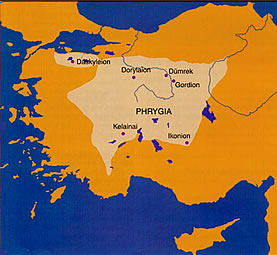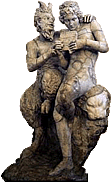

With in the last hundred years, digs in Gordion have been discovering the burial site who archeologists and scholars say to be that of King Midas. The artifacts buried along with the body suggest great wealth and success, but to say that he is the same King Midas of Phrygia known through myth is uncertain. If it is the same man then gold should not be a surprise find but what of a purple turban?
King Midas was seen through mythology as a foolish and greedy king. One who could not learn from his mistakes and though punished, was exceedingly lucky to have walked away both times relatively unharmed. There are two tales that seem to go in chronological order; the first is about greed and the second his foolishness.
Finding that Silenus (the drunkard adopted father of Dionysus) was in town and had dropped behind his party, King Midasí servants took and presented him to their king. Having been taught the art of drunkenness and considering Silenus an old buddy in the Bacchic rituals, King Midas ordered a round which went on for ten days. He then personally returned his inebriated friend to the party of Dionysus. Why would a king, drunk or not, return his friend himself, why not let the servants? Though a fool, he must have known there would be a reward, which was true and one much greater than he could have imagined.
While still happy with wine (which I mention to somewhat justify his choice) he is offered one wish from the appreciative Dionysus. Knowing his fortune was not enough to satisfy his constant craving; King Midas requested the golden touch. Knowing this was a foolish request and would only bring hardship for the king, Dionysus consents doing what was promised. Happily King Midas returns home, all along testing his powers turning leaves, branches and his fragrant roses to gold. All is in favor for the King until realizing the consequences of his choice. Thirsty and hungry to a desperate point, King Midas begs Dionysus to undue the gift and return him to his previous state. Seeing he was remorseful, it was gladly done by the God, and after entering the river Pactolus, Midas was freed from his foolish greed.

Detesting his fortune and way of life he retreats to the woods where he begins to worship Pan (god of shepherds). His following of Pan, one who is known for taking advantage of female peasants or simpletons, implies that he may not have chosen a wiser alternative for his life.
Pan was a womanizer at best and when singing his songs and whistling his tunes decidedly told his entourage of ignorant girls) that Apollo and his Lyre was no match for Panís pipes and voice. The mountain acting as judge opened his ears and sat patiently. Pan scratched out his tune and was then followed up by Apollo and his lyre. The mountain chose that pan should throw away his pipes; Apolloís lyre was the winner. Having heard Pan play and being easily satisfied, King Midas spoke out against the ancient mountainsí decision. Apollo decided that no normal set of ears could say such a lie and so exchanged Midasí badly tuned ears for a much larger set that were capable of telling the difference between good and bad music.
Embarrassed by his hybrid form King Midas returned to his home and covered his shame with a purple turban. Only his servant knew the secret who in turn told the earth who couldnít keep a secret either. When word got out, from the murmurs of whispering reeds, King Midasí shameful state became known to all.
Apollo must have been accustomed to musical competitions for Pan was not the only satyr to challenge his musical talent. There was another, Marsyas, but not born to Gods was punished harshly for his arrogance. At first glance, the two stories seem to be the same tale with two twists, but though closely related each has a very different outcome. One unique point is that in both stories, the punishment is afflicted upon a non God, Marsyas and King Midas.
Marsyas like Pan challenged Apollo to a duel of musical talent. The myth is not detailed concerning who judged this competition and what their thoughts were exactly but instead goes straight to the persecution and ultimate death of Marsyas. Even the reasoning for such a harsh punishment is not explained, only that he begged for his life and was mourned by many. So many, men and Gods alike mourned that the earth drank their tears and became the river Marsyas. This is said to be the clearest stream in the land. From the Godsí reactions it is made clear that greed though not something taken lightly remains less paramount than the respect of a God.
|
Works Cited
DeVries, Keith. "Gordion." Expedition 42.1 (2002): 18-20. Ebscohost. 27 Jan. 2007 http://web.ebscohost.com/ehost
Osborne, Mary Pope. "The Golden Touch." Scholastic Scope 52.11(2004): 12-13.
Ovid. The Metamorphoses. Trans. Charles Martin. New York: Norton, 2004.
Ovid. The Metamorphoses. Trans. Horace Gregory. New York: New American, 1958.